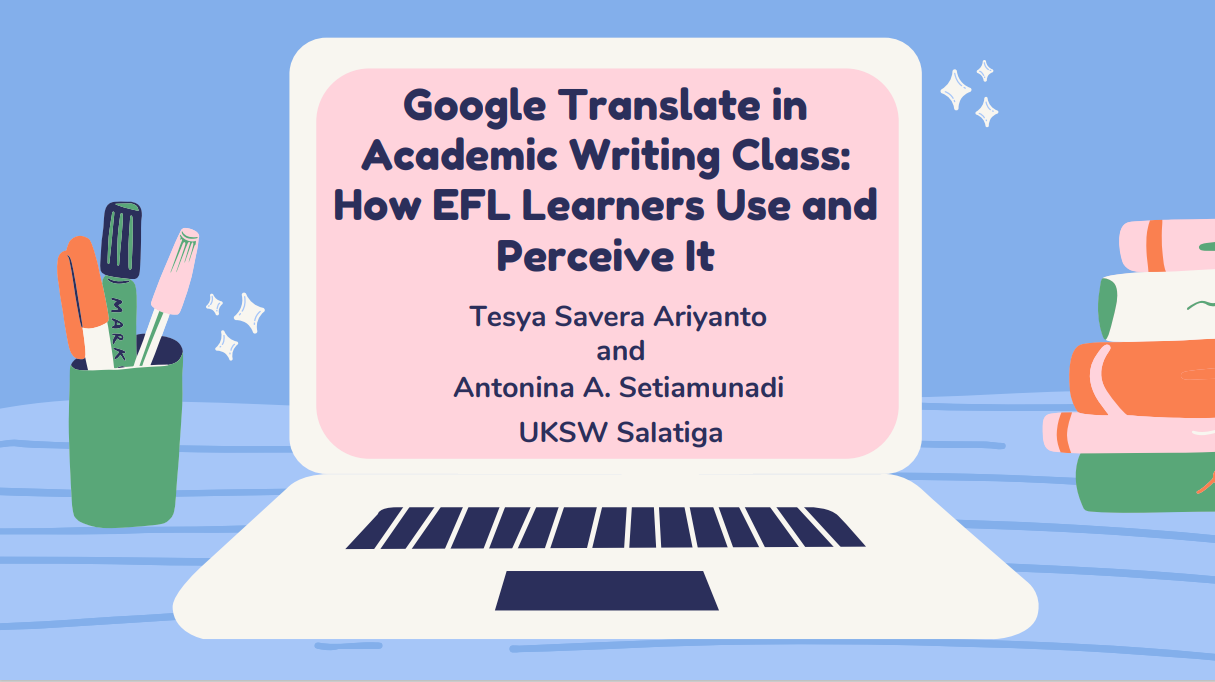Google Translate in Academic Writing Class: How EFL Learners Use and Perceive It
DOI:
https://doi.org/10.21070/jees.v8i2.1778Keywords:
learners’ perception, academic writing, impacts of Google TranslateAbstract
The purpose of this study is to investigate the perspectives of tertiary level Academic Writing students towards the use of GT in their Academic Writing class; whether they think it is helpful in assisting them in the learning process or not. The researchers attempted to answer the research question of “What are the learners’ perceptions towards the use of GT as a learning support in Academic Writing class?” because there are still very few studies that have examined the use of GT as a learning support tool in Academic Writing class. The study uses a qualitative approach through the use of interviews as a data collection instrument. The interviews were conducted with five participants from the English Language Education program of the Faculty of Language and Arts in one private university in Central Java. The participants are five students who had taken their Academic Writing class in the previous semester before the research was conducted. The findings of the study show that all participants agree that GT is helpful for them in reading and writing journal articles, and also helps them to expand their vocabulary. However, they perceive that they rely heavily on GT to help them finishing their writing assignments. Besides that, they perceive GT as not helping them become more proficient with English grammar.
HIGHLIGHTS:
- Students perceived Google Translate to be helpful for them in reading and writing journal articles, and by using Google Translate to help them reading and writing journal articles, their vocabulary knowledge also expands.
- However, the students also perceived that they had a big dependency on the use of Google Translate in helping them doing the reading and writing tasks in Academic Writing class.
- Another drawback from using Google Translate in their Academic Writing class is that they perceived it as not helping them become more proficient with English grammar.
Downloads
References
Al Fadda, H. (2012). Difficulties in academic writing: from the perspective of King Saud University postgraduate students. English Language Teaching Journal, 5(3), 123-130. https://doi.org/10.5539/elt.v5n3p123
Alfaki, I. M. A. (2015). University students’ English writing problems: diagnosis and remedy. International Journal of English Language Teaching, 3(3), 40-52. https://www.researchgate.net/profile/Ibrahim-Alfaki/publication/276273167_University_Students'_English_Writing_Problems_Diagnosis_and_Remedy/links/555479ae08ae6fd2d81f5850/University-Students-English-Writing-Problems-Diagnosis-and-Remedy.pdf
Alisha, F., Safitri, N., Santoso, I., & Siliwangi, I. (2019). Students’ difficulties in writing EFL. Professional Journal of English Education, 2(1), 20-25. https://doi.org/10.22460/project.v2i1.p20-25
Azizah, U. A., & Budiman, A. (2017). Challenges in writing academic papers for international publication among Indonesian graduates students. Journal of English Education and Linguistics Studies, 4(2), 175–197. https://doi.org/10.30762/jeels.v4i2.405
Bahri, H., & Mahadi, T. S. T. (2016). Google Translate as a supplementary tool for learning Malay: a case study at Universiti Sains Malaysia. Advances in Language and Literary Studies, 7(3), 161–167. https://doi.org/10.7575/aiac.alls.v.7n.3p.161
Doyle, A. (2022). What Is a Semi-Structured Interview?: Definition & Examples of a Semi-Structured Interview. New York, America, The Balance. https://www.thebalancemoney.com/what-is-a-semi-structured-interview-2061632
Flick, U. (2018). Designing Qualitative Research (2nd ed.). SAGE Publications Ltd. https://doi.org/10.4135/9781529622737
Giannetti, T. R. (2016). Google Translate as a Resource for Writing [Unpublished M.Ed. Thesis]. St. John Fisher University.
Google. (2023). Google Translate About. https://translate.google.com/about/
Groves, M., & Mundt, K. (2015). Friend or foe? Google Translate in language for academic purposes. English for Specific Purposes, 37, 112–121. http://dx.doi.org/10.1016/j.esp.2014.09.001
Harris, H. (2010). Machine translations revisited: issues and treatment protocol. The Language Teacher, 34(3), 25. https://doi.org/10.37546/jalttlt34.3-5
Hazari, A. (2014). Learning Curve: student perceptions have a huge impact on understanding. South China Morning Post. https://www.scmp.com/lifestyle/family-education/article/1407745/learning-curve-student-perceptions-have-huge-impact?module=perpetual_scroll_0&pgtype=article&campaign=1407745
Helda, W. (2018). Difficulties of Paraphrasing in Academic Writing for the Seventh Semester of English Department at UIN Antasari Banjarmasin. [Unpublished B.Ed. Thesis]. Antasari Banjarmasin Islamic State University. http://idr.uin-antasari.ac.id/id/eprint/9229
Ibrahim, A.-W. (2014). The students’ perception of teachers’ classroom effectiveness on their self-concepts in Lagos Metropolis. Journal of Teaching and Teacher Education, 2(2), 133–141. https://doi.org/10.12785/jtte/020209
Irvin, L. L. (2010). What is “academic” writing? In C. Lowe & P. Zemliansky (Eds.), Writing Spaces: Readings on Writing (Vol. 1, pp. 3–17). West Lafayette, Indiana: Parlor Press LLC. Https://wac.odostate.edu/docs/books/writingspaces1/writing-spaces-readings-on-writing-vol-1.pdf
Jin, L., & Deifell, E. (2013). Foreign language learners’ use and perception of online dictionaries: a survey study. MERLOT Journal of Online Learning and Teaching, 9(4), 515–533. https://citeseerx.ist.psu.edu/document?repid=rep1&type=pdf&doi=93278fbbdf2882587daa0498cb3a0677b9ff6afe
Johnson, M., Schuster, M., Le, Q. V., Krikun, M., Wu, Y., Chen, Z., Thorat, N., Viégas, F., Wattenberg, M., Corrado, G., Hughes, M., & Dean, J. (2017). Google’s multilingual neural machine translation system: enabling zero-shot translation. Transactions of the Association for Computational Linguistics, 5, 339–351. https://doi.org/10.1162/tacl_a_00065
Josefsson, E. (2011). Contemporary approaches to translation in the classroom: a study of students’ attitudes and strategies. [Unpublished B.A. Thesis]. Dalarna University. urn: nbn:se:du-5929. https://www.diva-portal.org/smash/get/diva2:519125/FULLTEXT01.pdf
Kol, S., Schcolnik, M., & Spector-Cohen, E. (2018). Google Translate in Academic Writing Courses? The EuroCALL Review, 26(2), 50–57. https://doi.org/10.4995/eurocall.2018.10140
Lestari, D. (2020). An analysis of students’ difficulties in writing undergraduate thesis at English education study program of Muhammadiyah University of Bengkulu. Premise: Journal of English Education and Applied Linguistics, 9(1), 17–29. https://doi.org/10.24127/pj.v9i1.2588
Medvedev, G. (2016). Google Translate in teaching English. The Journal of Teaching English for Specific and Academic Purposes, 4(1), 181–193. http://espeap.junis.ni.ac.rs/index.php/espeap/article/view/318/221
Nenotek, S. A., Tlonaen, Z. A., & Manubulu, H. A. (2022). Exploring University Students’ Difficulties in Writing English Academic Essay. AL-ISHLAH: Jurnal Pendidikan, 14(1), 909–920. https://doi.org/10.35445/alishlah.v14i1.1352
Safitri, C. D., Azisah, S., & Annur, M. J. (2021). The analysis of students’ challenges to thesis writing at UIN (Islamic State University). English Language Teaching for EFL Learners, 3(2), 41-53. https://doi.org/10.24252/elties.v3i2.21013
Samuels, P. (2019). Proposal Writing for Business Research Projects. (1st ed.). Routledge. https://doi.org/10.4324/9781003285137
Sitompul, S. K., & Anditasari, A. W. (2022). Challenges in writing academic research: an exploration of master’s students’ experiences. Getsempena English Education Journal, 9(2), 136–148. https://doi.org/10.46244/geej.v9i2.1805
Sukkhwan, A. (2014). Students’ Attitudes and Behaviors towards the Use of Google Translate. [Unpublished M.Ed. Thesis]. Prince of Songkla University. https://kb.psu.ac.th/psukb/bitstream/2010/9459/1/387714.pdf

Published
How to Cite
Issue
Section
License
Copyright (c) 2023 Tesya Savera Ariyanto, Antonina Anggraini Setiamunadi

This work is licensed under a Creative Commons Attribution 4.0 International License.







